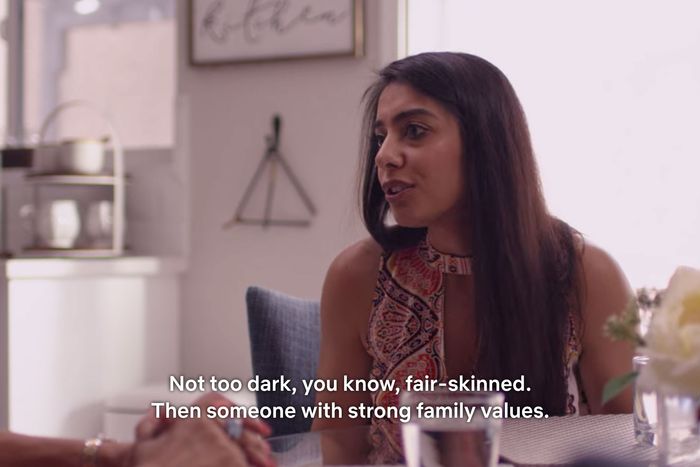
It might seem strange to invoke an Alice Walker essay in connection with the new Netflix reality series, Indian Matchmaking, but, here we go. In the essay, “If the Present Looks Like the Past, What Does the Future Look Like?”, the Color Purple author and social critic (and, of late, conspiracy theorist) tells a small story, about a “very light-skinned” black man who rejects a strikingly beautiful, “very very black girl” named Doreena. His parents considered her too dark to join “their cream-colored family,” according to Walker, who personally knew the parties involved. Published in 1983, as part of the collection “In Search of Our Mother’s Gardens,” the essay introduced the world to the word “colorism,” which Walker coined to describe discrimination among black people based on skin color. The essay is revolutionary for that coinage. But there’s a subtler innovation it offers as well. Walker explicitly draws a connection between skin color and marriage. She suggests that dark-skinned women might find it smarter to simply opt out of their own endemic marriage market and head elsewhere, where perhaps they are exoticized or fetishized, but they aren’t seen as un-marriageable. Walker tells us two smaller, adjoining stories, about herself and a friend in their single days. “I remember being literally pushed off the sidewalk outside the Dom in New York, by young black men who wanted to speak to the white women I was with,” she writes. “Perhaps it is no accident that my best friend during this period was a black black woman from Africa who was never approached by black men for dates. She dated instead a white seminary student from Texas, while my fiancé was an Irish Jew from New England.”
In the Netflix series Indian Matchmaking, the importance of skin color arrives quickly in talk of matrimony, as do other facets of packaged appearance, the sorts that indicate a notion of a stratified universe: This level of education matches with this one, this shade of skin with this, this height with this, these family values with these, this caste with this, this region with this, and so on. The show features an Indian woman, Sima Taparia, billed as Mumbai’s top matchmaker. In the series, she takes on clients in India and America, young desi men and women who seem, for all their desire to get properly paired off, equally conflicted about the whole endeavor. The women work and travel; they like their lives and have friends who offer the sort of support a spouse might. The men aren’t sure if they want a mom or a boss or a confidante or freedom to be without any of the above. They work — for the family business, for themselves — they cook, they desire mutual attraction, but also to ease their mom’s anxieties. All seem to want, at some level, simple, non-transactional, unconditional affection.
At the same time, they talk in transactional terms. The series leaves us with a somewhat haunting vision, an echo of a refrain repeated throughout the show, but one that lands louder with our final subject. Richa is the child of immigrants to America and speaks with a generic American flatness. Close your eyes, and you’d have no sight of India. Yet, certain notes cut through the assimilative blur. She “wants to please my parents,” she begins. “Richa has beauty, she has smile,” Taparia tells us in a somewhat rote cadence. “She’s tall, slim, trim, educated, from a good family. I can give her I think 95 marks out of hundred. So she has the upper hand, to choose the boys.” In this framework, marriage is a game, players burdened or blessed depending on circumstances, as they make their way through the board. And what does Richa, this lucky player, want? Someone who gets along easily with her family, someone passionate about his line of work, extroverted, gym-going, a collaborative cook. Then it arrives: “not too dark, you know, like fair-skinned,” she says, with the same sense of certainty — Doesn’t everybody want this? Why do I even have to spell it out? — given to all the other preferences, her eyes widening, as she continues. “Then someone with family values.”
The casualness with which the preference for light skin arrives in the series — delivered perhaps most strikingly in Richa’s articulation of it — has caused consternation. Some viewers seemed to separate the show’s evident entertainment value (it was ranked in the most popular section of Netflix over its debut weekend) from its troubling aspects, to make sense of their draw to it. On Twitter, people have accused Netflix of idealizing a Hindu-supremacist ideology, while others protest that the show should at least offer critique of the -isms at play. A Pakistani-American friend wrote me saying that she’d be fine with the show if white people weren’t watching it, given that it might serve to reinforce reductive notions of a place and people. (But then, colorism and racism have long been seen as forces at loggerheads — air your dirty laundry, and white people only have more reason to stereotype.)
Personally, I found all the debate confusing. The show presents reality more or less as it is, with, of course, all the toying with reality built in to a reality-TV show. But small manufactured dramas aside, it presented a more unvarnished view than usual. On The Bachelor, where judgments based on skin color happen as a rule, a euphemism — that someone is not a “good fit” — veils the truth. At least on this show, people state things in reflection of the warts-and-all truth. Hindus are largely casteist. Much of India, today, leans Hindu supremacist. Marriage is a business and a game, whether in India or America, and grotesque from many angles. Taparia seems to hit on some profound, universal truth when at the show’s beginning she blithely references not the “wedding industry,” but the “marriage industry,” a term I’d never heard but which resonated.
I’m Indian-American, considered too dark for my own good from the moment I arrived. When I was brought home from the hospital, the Bengali woman my parents hired as a sitter for my toddler brother asked if I’d ever turn lighter, like my brother. The way the story was later told to me, she was expressing a hope; she worried for me. And why shouldn’t she, given the reality made so explicit by Walker, and now, by Netflix? As the “Dark Is Beautiful” advocacy campaign took root in India over a decade ago, I discerned a shift that seemed to indicate the steepness of this uphill battle. In 2009, when I interned in Delhi, an Indian guy chatted me up. He was nice enough, someone I might consider speaking with at length; then he let me know that he wasn’t one of those guys who cared about skin color. He thought dark skin was sexy, he explained, as if ready to be presented a medal. The equation of darkness with a feral sexuality is, of course, as pernicious as any other reduction; the reference to skin color at all is a tell. White men, black men, Latino men, women, too —members of all tribes have made comments to me about my skin, with the implication that some girls you marry, some you fuck.
Of course the older — and further from traditional matrimonial age — you get, the more you learn not to care too much about what anyone says about you, good or bad. Moreover, I’ve always felt lucky to be born dark, even as a young kid. My darkness gave me a kind of heightened understanding. Like Walker and her friend, my first brush with partnership involved self-opting out of the Indian scene; I dated and married a white man I loved, propelled in part by a guiding instinct that I stood a better chance of a fair shake outside my own community. Then I got divorced. Now, watching any Netflix show, any couple on a date, any relationship at play at any stage, it’s hard not to see the transactional nature built in to the whole experience. Men list their height on dating apps with a kind of resigned dutifulness (or fudge it). An invisible matchmaker can seem to guide the hand of even the most liberated swiper. Women still angle to please men; men to please their moms. As for me, I’d prefer not to play the game at all anymore, though I catch myself readying the pieces occasionally. Watching Indian Matchmaker, though, I did not feel anger, but a bemused relief, even validation. Two of my most profound decisions in life made a lot of sense: first, to exit my community in search of companionship, and second, to exit marital companionship, to not marry at all. When the game itself is dirty, why yell at a mirror pointed at it, reflecting the moves for all to see?


